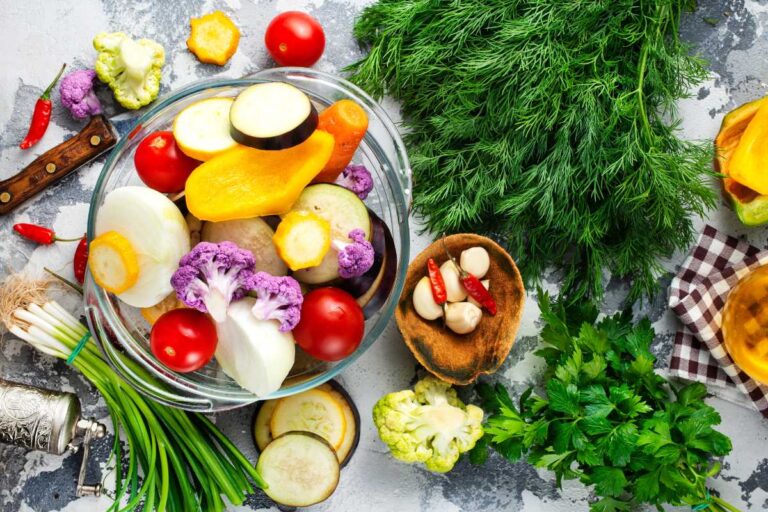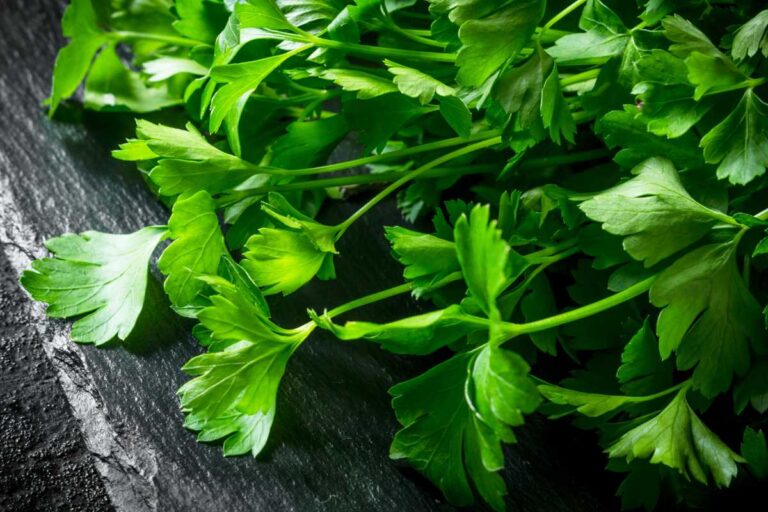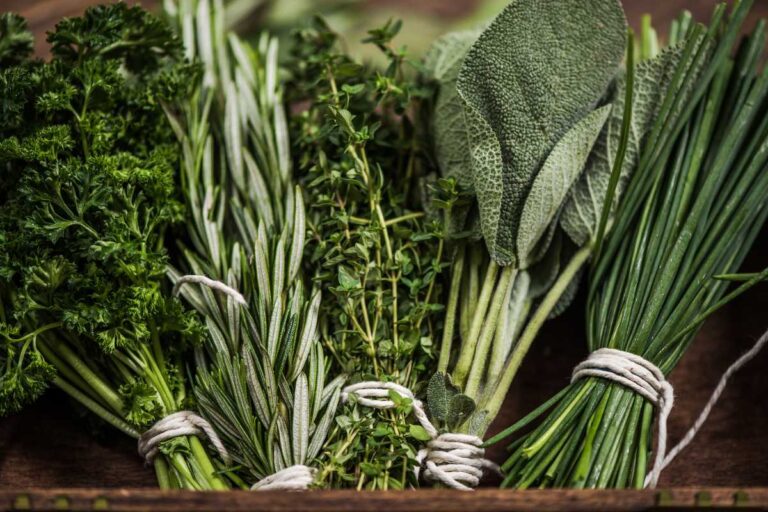Which Herb Is Superfood? Uncover the Top 8 Superfood Herbs for Optimal Health
Which Herb Is Superfood? Uncover the Top 8 Superfood Herbs for Optimal Health

Superfood herbs and spices are nutrient-dense plants with exceptional health benefits. These natural ingredients have been used for centuries in traditional medicine and cooking. Incorporating superfood herbs and spices into one’s diet can support overall well-being.
Herbs and spices, such as cloves, star anise, rosemary, pepper, and cinnamon, are not only popular additions to recipes but also offer a plethora of health advantages.
Rich in minerals and antioxidants, these potent plants provide a great source of essential nutrients that can enhance the body’s immune system and promote optimal health.
From adding flavor to soups and pasta sauces to infusing dishes with aromatic profiles, superfood herbs and spices offer a myriad of recipe ideas that go beyond taste.
With their potential to improve digestion, reduce inflammation, boost brain function, regulate blood sugar levels, and even support weight loss efforts, it is no wonder why they have garnered attention as natural remedies for various ailments.
Prepare to explore their remarkable properties as we uncover how incorporating them into your diet can make a significant impact on your overall health.
Tired of struggling with outdoor herb gardens in unpredictable weather? Discover the secret to successful herbal gardening indoors and enjoy fresh herbs year-round. Check out our article now!
Top superfood herbs and spices for health benefits
1. Turmeric:
Turmeric is a vibrant yellow spice that has gained popularity as a superfood herb due to its numerous health benefits. One of the key components of turmeric is curcumin, which gives it its powerful anti-inflammatory properties.
Inflammation is a natural response in the body, but when it becomes chronic, it can lead to various diseases such as heart disease, diabetes, and cancer. By incorporating turmeric into your diet, you can help reduce inflammation and potentially lower the risk of these conditions.
2. Ginger:
Ginger is not only a versatile herb used in cooking but also offers remarkable health benefits. It is well-known for its ability to aid digestion by stimulating the production of digestive enzymes and reducing gastrointestinal discomfort.
If you suffer from nausea or motion sickness, ginger can provide relief by soothing the stomach. Studies have shown that ginger may help alleviate muscle pain and soreness, making it an excellent option for athletes or those recovering from intense workouts.
3. Cinnamon:
Beyond being a delightful addition to baked goods and beverages, cinnamon has been linked to improved blood sugar control. This aromatic spice contains compounds that mimic insulin’s effects in the body, helping regulate blood glucose levels.
For individuals with type 2 diabetes or insulin resistance, incorporating cinnamon into their diet may contribute to better glycemic control. Moreover, cinnamon possesses antioxidant properties that protect cells from damage caused by harmful molecules called free radicals.
4. Ashwagandha:
Ashwagandha is an adaptogenic herb widely used in traditional Ayurvedic medicine for its stress-reducing properties. Chronic stress can have detrimental effects on both physical and mental health.
Ashwagandha helps combat stress by regulating cortisol levels—the hormone responsible for our body’s stress response—resulting in a sense of calmness and relaxation. This herb has been associated with improved sleep quality, reduced anxiety levels, and enhanced cognitive function.
5. Oregano:
Oregano is not just a flavorful herb used in Italian cuisine; it also offers several health benefits. It contains potent antioxidants that help protect the body against damage from free radicals.
Oregano is rich in vitamins A, C, and K as well as minerals like calcium, iron, and manganese. Moreover, its antimicrobial properties make it an effective natural remedy for fighting bacterial infections.
6. Garlic:
Garlic has long been recognized for its medicinal properties. It contains a compound called allicin, which provides numerous health benefits.
Garlic has been shown to have antibacterial, antiviral, and antifungal properties that can help fight off infections. It may contribute to heart health by reducing blood pressure and cholesterol levels.
7. Cilantro (Coriander):
Cilantro is an herb commonly used in various cuisines worldwide. Not only does it add a burst of freshness to dishes, but it also offers potential health benefits.
Cilantro is rich in antioxidants that help protect against cellular damage caused by oxidative stress. Furthermore, some studies suggest that cilantro may have chelating properties—meaning it can help remove heavy metals from the body.
8. Black Pepper:
Black pepper is more than just a staple spice on your dining table—it also possesses unique health-promoting properties.
Growing and incorporating superfood herbs into daily life
Having access to fresh, organic superfoods can greatly enhance the nutritional value of your meals. One way to ensure that you always have these nutrient-rich ingredients at hand is by creating an herb garden right in the comfort of your own home.
By growing your own herbs, you not only save money but also have the satisfaction of knowing exactly where your food comes from.
Here are some steps to help you get started with your very own herb garden:
- Choose a suitable location: Find a sunny spot in your home or backyard where your herbs can receive at least six hours of sunlight each day. This will provide them with the necessary energy to grow and thrive.
- Select the right herbs: Consider which superfood herbs you would like to grow based on their health benefits and culinary uses. Some popular options include basil, rosemary, thyme, mint, and parsley. These green wonders are packed with bioactive compounds that support various bodily functions.
- Prepare the soil: Ensure that the soil is well-draining and rich in nutrients. You may need to amend it with compost or organic matter to create an ideal environment for your herbs’ growth.
- Planting and care: Follow the instructions on seed packets or young plant labels for optimal planting depths and spacing. Water them regularly, but avoid overwatering as this can lead to root rot. Consider using natural pest control methods to protect your plants from unwanted visitors.
Once your herb garden starts flourishing, it’s time to incorporate these flavorful ingredients into your daily meals. Here are some creative ways to use fresh superfood herbs in cooking:
- Sprinkle chopped basil leaves over a Caprese salad for a burst of freshness.
- Infuse rosemary sprigs into olive oil for a fragrant dressing.
- Add thyme leaves to roasted vegetables for an earthy aroma.
- Blend mint leaves into a refreshing smoothie for a cooling effect.
- Garnish your dishes with parsley to add a vibrant touch of green.
However, if growing herbs at home is not feasible for you, there are other options available. Dried or powdered forms of superfood herbs can be easily incorporated into your meals, smoothies, or teas. These convenient alternatives still retain many of the beneficial properties found in fresh herbs.
When selecting dried or powdered herbs, ensure that they are sourced from reputable suppliers to guarantee their quality and potency. You can find these products in health food stores or online platforms dedicated to organic and natural products.
In cases where fresh or dried herbs are not easily accessible, herbal supplements can provide an alternative means of obtaining the bioactive compounds found in superfood herbs.
These supplements come in various forms such as capsules, tablets, tinctures, or extracts and can be tailored to meet specific health needs.
It’s important to note that while incorporating superfood herbs into your daily routine can support overall well-being, they should not replace any prescribed medical treatment.
If you have underlying health conditions or concerns, it is always advisable to consult with a healthcare professional before making significant dietary changes.
Health benefits of superfood herbs for immunity
Superfood herbs are known for their exceptional health benefits and medicinal properties. These natural wonders have been used for centuries to support the immune system, fight infections, and promote overall well-being.
Echinacea: Boosts immune function by stimulating the production of white blood cells.
Echinacea is a powerful herb renowned for its immune-boosting properties. It works by stimulating the production of white blood cells, which play a crucial role in defending the body against harmful pathogens.
By enhancing immune function, echinacea helps reduce the risk of infections and supports faster recovery from illnesses. This herb is particularly effective in combating respiratory conditions such as the common cold and flu.
Elderberry: Rich in antioxidants, elderberry can help strengthen the immune system.
Elderberry is packed with antioxidants that provide numerous health benefits, including strengthening the immune system. These antioxidants help neutralize free radicals and protect cells from damage caused by oxidative stress.
By fortifying the immune system, elderberry can reduce the severity and duration of viral infections like influenza. It possesses anti-inflammatory effects that may alleviate allergy symptoms.
Astragalus: Supports immune health by enhancing the body’s defense mechanisms against pathogens.
Astragalus has long been recognized for its ability to support immune health. This herb enhances the body’s defense mechanisms against pathogens by boosting white blood cell activity and promoting their production.
With its anti-inflammatory properties, astragalus also aids in reducing inflammation within the body. Regular consumption of astragalus supplements or tea can help prevent recurrent infections while providing an overall boost to your immunity.
Garlic: Contains compounds that enhance immune cell activity and may help fight infections.
Garlic is not only a flavorful addition to various dishes but also a potent superfood herb with remarkable health benefits. It contains compounds like allicin, which have been shown to enhance immune cell activity and potentially fight off infections.
Garlic’s antimicrobial properties make it effective against a range of bacterial, viral, and fungal pathogens. This herb has been associated with potential cancer-fighting properties.
Incorporating these superfood herbs into your diet or taking them as supplements can significantly benefit your immune system. However, it’s important to remember that they should not replace medical advice or prescribed treatments.
Consult with a healthcare professional before using any new herbs or supplements, especially if you have underlying health conditions or are taking medications.
By harnessing the power of echinacea, elderberry, astragalus, and garlic, you can give your immune system an extra boost and support its ability to defend against infections and maintain overall well-being. Embrace the wonders of nature and explore the incredible benefits these superfood herbs offer for your immunity.
Remember to seek high-quality products from reputable sources to ensure maximum effectiveness when incorporating these herbs into your wellness routine. Stay healthy and let nature lend a helping hand in safeguarding your immune system!
Enhancing gut health with superfood herbs
Peppermint: Relieves digestive discomfort such as bloating or indigestion.
Peppermint, an herbal superfood known for its refreshing taste and invigorating aroma, offers more than just a pleasant sensory experience. This versatile herb has long been recognized for its ability to alleviate various digestive issues.Peppermint takes the lead.
One of the key benefits of peppermint lies in its ability to relieve digestive discomfort. It is particularly effective in reducing bloating and indigestion, making it a go-to remedy for those struggling with post-meal uneasiness.
The active compounds found in peppermint help relax the muscles of the gastrointestinal tract, promoting smoother digestion and relieving symptoms that can hinder overall well-being.
Licorice root: Soothes the stomach lining and supports healthy digestion.
Licorice root has been used for centuries as a natural remedy for numerous ailments, including digestive troubles. This remarkable herb not only soothes the stomach lining but also plays a vital role in supporting healthy digestion.
The beneficial properties of licorice root are attributed to glycyrrhizic acid, which possesses anti-inflammatory properties that aid in reducing inflammation within the gut.
By calming irritation and protecting the delicate mucous membranes lining our stomachs, licorice root helps maintain optimal gut health. Licorice root stimulates mucus production, creating a protective barrier against harmful bacteria and promoting a healthier environment within our digestive system.
Fennel seeds: Aid digestion by reducing gas and bloating.
Fennel seeds have long been revered for their culinary uses due to their distinct flavor profile reminiscent of licorice or anise.
However, these tiny seeds offer more than just a flavorful addition to dishes; they are also highly regarded for their ability to aid digestion by reducing gas and bloating.
Rich in essential oils, fennel seeds possess carminative properties that help relax the muscles of the gastrointestinal tract, allowing for smoother digestion and reducing discomfort caused by excessive gas.
Furthermore, these aromatic seeds can alleviate bloating by preventing the formation of gas in the first place. Incorporating fennel seeds into your diet or enjoying a cup of fennel tea after a meal can provide relief and promote optimal digestive function.
Chamomile: Calms the digestive system and may alleviate symptoms of irritable bowel syndrome (IBS).
Chamomile, known for its calming properties and delicate floral scent, is not only a popular herbal tea but also an herb that offers significant benefits for gut health. This gentle yet powerful herb has been used for centuries to soothe various digestive ailments.
Chamomile works wonders in calming the digestive system, making it an excellent choice for those experiencing discomfort or indigestion.
The anti-inflammatory compounds found in chamomile help reduce inflammation within the gut, alleviating symptoms associated with conditions like irritable bowel syndrome (IBS). Moreover, chamomile’s relaxing effects extend beyond physical comfort; it can also have a positive impact on mental well-being by promoting relaxation and relieving stress—an added bonus.
Overall well-being: The power of superfood herbs and spices
Superfoods have gained immense popularity in recent years due to their exceptional nutritional value and beneficial effects on overall health. Among these superfoods, certain herbs and spices stand out for their remarkable ability to enhance well-being.
Let’s explore some of the most powerful antioxidant-rich herbs that can promote optimal health, from boosting energy levels to supporting brain function.
Ginseng: Boosts energy levels, reduces fatigue, and enhances mental clarity.
Ginseng is a renowned herb known for its ability to provide a natural energy boost. It has been used for centuries to combat fatigue and increase stamina.
This superfood contains powerful compounds that help improve blood circulation, allowing oxygen and nutrients to reach cells more efficiently. As a result, ginseng can enhance physical performance and reduce feelings of tiredness.
Moreover, ginseng is believed to have cognitive benefits as well. Its active components stimulate brain activity, improving concentration, memory retention, and mental clarity. By incorporating ginseng into your daily routine, you can experience increased productivity while combating mental exhaustion.
Holy basil: Known for its adaptogenic properties, holy basil helps combat stress and promotes relaxation.
Holy basil, also known as tulsi, holds a revered place in Ayurvedic medicine for its adaptogenic properties. This means it helps the body adapt to various stressors by regulating stress hormones like cortisol. By reducing the impact of stress on our bodies, holy basil promotes relaxation and overall well-being.
In addition to its stress-relieving abilities, holy basil is rich in antioxidants that protect against free radicals – harmful molecules that contribute to aging and disease development. These potent antioxidants support heart health by reducing inflammation and promoting healthy blood flow.
Rosemary: Contains antioxidants that support brain health and memory function.
Rosemary not only adds delightful flavor to culinary creations but also offers numerous health benefits. This herb contains powerful anti-inflammatory compounds and antioxidants that protect the brain from aging-related damage.
Research suggests that rosemary may improve memory and cognitive function by preventing the breakdown of acetylcholine, a neurotransmitter essential for learning and memory.
Furthermore, rosemary’s antioxidant properties help combat oxidative stress, which is linked to various neurological disorders. By incorporating rosemary into your diet or using its essential oil, you can potentially support brain health and protect against age-related cognitive decline.
Oregano: Packed with antioxidants, oregano has antimicrobial properties that can help fight infections.
Oregano is not only a flavorful herb but also a rich source of nutrients and antioxidants. Its active compounds have potent antimicrobial properties, making it an effective natural remedy for fighting infections caused by bacteria or fungi.
Oregano oil has been used for centuries as an alternative treatment for various ailments due to its powerful antibacterial and antifungal effects.
Moreover, oregano contains high levels of antioxidants that neutralize free radicals in the body. These free radicals contribute to cell damage and are associated with chronic diseases such as cancer and heart disease.
By adding oregano to your meals or using its oil in moderation, you can harness its immune-boosting benefits and promote overall health.
Incorporating these superfood herbs into your daily routine can have a significant impact on your overall well-being.
Unveiling the Ultimate Superfood Herb
Moringa: The Miracle Tree Packed with Nutrients
Dubbed as a “miracle tree,” moringa is an herb that has gained significant attention in recent years due to its exceptional nutritional profile. This superfood herb is rich in vitamins, minerals, and antioxidants, making it a powerhouse of health benefits.
One outstanding feature of moringa is its leaves, which contain all essential amino acids. This means that it serves as a complete plant-based protein source, making it an excellent option for vegetarians and vegans looking to meet their protein needs.
Whether you’re following a plant-based diet or simply seeking alternative protein sources, incorporating moringa into your meals can be highly beneficial.
A Multitude of Health Benefits
Moringa goes beyond being just a good source of protein; it also supports overall health by providing essential nutrients. For instance, it contains high levels of iron, which plays a vital role in maintaining healthy blood cells and preventing anemia. Moringa is packed with calcium, promoting strong bones and teeth.
Vitamin C is another nutrient abundantly found in this versatile herb. With its potent antioxidant properties, vitamin C helps boost the immune system and protects against harmful free radicals. Including moringa in your daily routine can help strengthen your body’s defense mechanisms naturally.
Various Forms for Consumption
One of the remarkable aspects of moringa is its versatility. You can find this superfood herb available in different forms such as powder or capsules. This allows you to choose the most convenient way to incorporate it into your diet based on personal preferences and lifestyle.
If you prefer adding flavor and nutrition to your dishes directly, moringa powder can be sprinkled onto salads or mixed into smoothies for an extra nutrient kick.
On the other hand, if you’re always on-the-go or prefer a more convenient option, moringa capsules offer a quick and easy way to reap the benefits of this superfood herb.
Exploring Other Prominent Herbs
While moringa stands out as an ultimate superfood herb, there are other popular ingredients within the herbal world that deserve recognition for their unique properties. Let’s take a closer look at some of these herbs:
- Ginseng: Known for its adaptogenic properties, ginseng has been used in traditional medicine for centuries. It is believed to enhance mental clarity, boost energy levels, and support overall well-being.
- Sage: Sage extract is often used for its potential cognitive benefits. Studies suggest that sage may improve memory and concentration due to its active ingredient called rosmarinic acid.
- Fennel: With its distinct aroma and flavor, fennel is commonly used as a culinary spice. It also offers digestive benefits and may help alleviate symptoms like bloating and indigestion.
- Cardamom: This aromatic spice from the mint family not only adds a delightful taste to dishes but also provides various health benefits. Cardamom has been linked to improved digestion, reduced inflammation, and enhanced heart health.
- Tulsi (Holy Basil): Revered in Ayurvedic medicine, tulsi is known for its adaptogenic properties that can help combat stress and promote relaxation.
- Turmeric: This vibrant spice is known for its anti-inflammatory properties and may help improve joint health and reduce the risk of chronic diseases.
- Ashwagandha: Used in Ayurvedic medicine, ashwagandha is believed to reduce stress, improve cognitive function, and boost energy levels.
- Chamomile: Chamomile tea is often used for its calming effects and may help promote better sleep, reduce anxiety, and soothe digestive discomfort.
- Echinacea: Echinacea is commonly used to support the immune system and may help reduce the duration and severity of cold symptoms.
- Peppermint: Peppermint oil or tea can provide relief from digestive issues such as bloating, gas, and stomach cramps. It may also help alleviate headaches and improve focus.
Exploring Ayurvedic superfoods and herbs
We have seen how these superfood herbs can contribute to overall well-being and enhance our lives in various ways.
To continue reaping the benefits of Ayurvedic superfoods and herbs, consider incorporating them into your daily routine.
Whether it’s adding turmeric to your meals for its anti-inflammatory properties or sipping on a cup of tulsi tea for stress relief, these small changes can make a significant difference in your overall health. Embrace the power of nature’s gifts and discover the wonders they can bring to your life.
FAQs
Are Ayurvedic superfood herbs safe for everyone?
Ayurvedic superfood herbs are generally safe for most people when used in moderation. However, it is always advisable to consult with a healthcare professional before incorporating any new supplements or herbs into your routine, especially if you have underlying health conditions or are taking medications.
Can I consume Ayurvedic superfood herbs during pregnancy?
Pregnant women should exercise caution when consuming Ayurvedic superfood herbs as certain herbs may not be suitable during pregnancy. It is best to consult with a healthcare provider who specializes in prenatal care to ensure the safety of both mother and baby.
How long does it take to see results from using Ayurvedic superfood herbs?
The time it takes to see results from using Ayurvedic superfood herbs can vary depending on various factors such as individual body chemistry, dosage, frequency of use, and consistency. While some people may experience noticeable benefits within a few weeks, others may require longer periods of consistent use before seeing significant changes.
Can I use Ayurvedic superfood herbs alongside my prescribed medications?
If you are currently taking prescribed medications, it is crucial to consult with your healthcare provider before incorporating Ayurvedic superfood herbs into your routine. Some herbs may interact with certain medications, potentially causing adverse effects or reducing the effectiveness of the medication.
Where can I purchase Ayurvedic superfood herbs?
Ayurvedic superfood herbs can be found in various health food stores, specialty herbal shops, and online retailers. It is important to ensure that you are purchasing high-quality products from reputable sources to guarantee their authenticity and efficacy.







